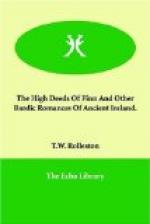Cormac then asked of Flahari why he had suffered himself to be brought into this trouble. “I did so,” said Flahari, “to prove the four counsels which my father gave them ere he died, and I have proved them and found them to be wise. In the first place, it is not wise for any man that is not a king to take the fosterage of a king’s son, for if aught shall happen to the lad, his own life is in the king’s hands and with his life he shall answer for it. Secondly, the keeping of a secret, said my father, is not in the nature of women in general, therefore no dangerous secret should be entrusted to them. The third counsel my father gave me was not to raise up or enrich the son of a serf, for such persons are apt to forget benefits conferred on them, and moreover it irks them that he who raised them up should know the poor estate from which they sprang. And good, too, is the fourth counsel my father gave me, not to entrust my treasure to my sister, for it is the nature of most women to regard as spoil any valuables that are entrusted to them to keep for others.”
VII
THE JUDGMENT CONCERNING CORMAC’S SWORD
When Cormac, son of Art, son of Conn of the Hundred Battles, was High King in Erinn, great was the peace and splendour of his reign, and no provincial king or chief in any part of the country lifted up his head against Cormac. At his court in Tara were many noble youths, who were trained up there in all matters befitting their rank and station.
One of these youths was named Socht, son of Fithel. Socht had a wonderful sword, named “The Hard-headed Steeling,” which was said to have been long ago the sword of Cuchulain. It had a hilt of gold and a belt of silver, and its point was double-edged. At night it shone like a candle. If its point were bent back to the hilt it would fly back again and be as straight as before. If it was held in running water and a hair were floated down against the edge, it would sever the hair. It was a saying that this sword would make two halves of a man, and for a while he would not perceive what had befallen him. This sword was held by Socht for a tribal possession from father and grandfather.
There was at this time a famous steward to the High King in Tara whose name was Dubdrenn. This man asked Socht to sell him the sword. He promised to Socht such a ration as he, Dubdrenn, had every night, and four men’s food for the family of Socht, and, after that, Socht to have the full value of the sword at his own appraisement. “No,” said Socht. “I may not sell my father’s treasures while he is alive.”
And thus they went on, Dubdrenn’s mind ever running on the sword. At last he bade Socht to a drinking-bout, and plied him so with wine and mead that Socht became drunken, and knew not where he was, and finally fell asleep.
Then the steward takes the sword and goes to the King’s brazier, by name Connu.




